Denial
 for thematic material and brief strong language.
for thematic material and brief strong language.
Reviewed by: Hannah NeCamp
CONTRIBUTOR
| Moral Rating: | Better than Average |
| Moviemaking Quality: |
|
| Primary Audience: | Adults Older Teens |
| Genre: | Biography History Drama |
| Length: | 1 hr. 50 min. |
| Year of Release: | 2016 |
| USA Release: |
September 30, 2016 (limited—5 U.S. theaters) October 14, 2016 (96 theaters) October 28, 2016 (wide—587 theaters) DVD: January 3, 2017 |
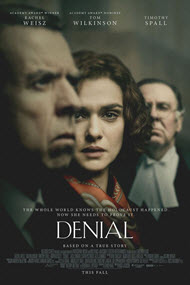


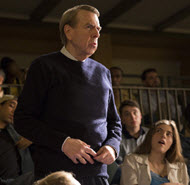
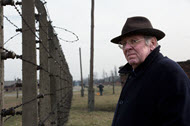
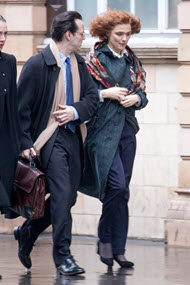
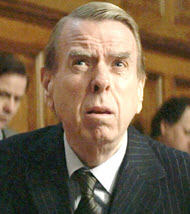

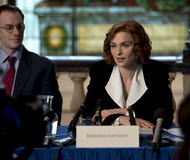
About murder in the Bible
About death in the Bible
About sin and the fall of man
Why does God allow innocent people to suffer? Answer
What about the issue of suffering? Doesn’t this prove that there is no God and that we are on our own? Answer
Does God feel our pain? Answer
What about the Psalm 91 promises? (“…no harm will befall you, no disaster will come near your tent…”) Answer
ORIGIN OF BAD—How did bad things come about? Answer
Did God make the world the way it is now? What kind of world would you create? Answer
| Featuring |
|---|
|
Rachel Weisz … Deborah Lipstadt Tom Wilkinson … Richard Rampton Andrew Scott … Anthony Julius Timothy Spall … David Irving Mark Gatiss … Professor Robert Jan van der Pelt Jack Lowden … James Libson Harriet Walter … Caren Pistorius … Laura Tyler See all » |
| Director |
| Mick Jackson — “Volcano” (1997), “The Bodyguard” (1992) |
| Producer |
|
Krasnoff/Foster Entertainment Participant Media Shoebox Films |
| Distributor |
| Bleecker Street Media |
“The whole world knows the Holocaust happened. Now she needs to prove it.”
Based on the book History on Trial: My Day in Court with a Holocaust Denier
My family and I enjoy a good courtroom drama. My parents grew up on Perry Mason, and we have watched all of the reruns… probably at least twice. “Denial” is a good courtroom drama, a very good courtroom drama. The lines are drawn, strategies are hatched, the contest joined, the tension mounts. Will justice be served? In a world where justice is often denied, a good courtroom drama can be a salve for souls who are created in the image of the God of justice.
Yes, “Denial” is a very good courtroom drama, but what takes this movie to a completely different level is that it is a courtroom drama raised from the ashes of the Holocaust. And that makes this movie utterly compelling. Generations now seventy-five years removed from the Holocaust simply cannot be allowed to be ignorant; those among us who are older cannot be allowed to become numb or forgetful. The Holocaust did not happen because a group of Hitler’s lieutenants met at Wannsee. The Holocaust happened because thousands of people opened their hearts to hatred, thousands of people did not care, thousands of people closed their eyes, thousands of people denied what was happening. “Denial” reminds us that those people walk among us still, that hatred and cruelty and indifference to the suffering of others did not vacate the planet in 1945.
The story… Deborah E. Lipstadt (Rachel Weisz) was (and still is) a professor of Jewish and Holocaust studies at Emory University and a recognized authority in the field. While fielding questions at a seminar in 1994, the name of David Irving (Timothy Spall) came up. Irving had become internationally notorious for his denial of the Holocaust, and Lipstadt called attention to his racism and anti-Semitism in some of her books. Lipstadt declined the opportunity to make Irving the focus of the discussion, but then Irving himself rose from the audience, videographer in tow, to make a scene. He obviously was prepared for the occasion, and Lipstadt obviously was not. After ranting about the fraud being perpetrated upon the world, he raised a fist full of a thousand dollars and offered it to anyone who could prove the Holocaust. Quite a scene and quite an impact, judging from the crowd of students later waiting for an autographed—and free—copy of his latest book…
Move forward to 1996, and Lipstadt learns from her publisher in London that Irving has filed a libel suit against both publisher and author. In it, he claims that she injured his reputation by claiming him to be a Holocaust-denier and a racist who deliberately distorted evidence to suit his prejudices. Further adding to the drama, the suit was filed in Great Britain, where the burden of proof is upon the defendant to show that the supposedly libelous claims are, in fact, true. When Lipstadt decided to fight a most inconvenient—and expensive—battle, rather than to quietly settle out-of-court and hope for some peace and quiet, the battle begins in earnest.
Penguin Books, the publisher, fields a legal dream team. Solicitor Anthony Julius (Andrew Scott) leads the group preparing the case, and barrister Richard Rampton QC (Tom Wilkinson) will argue the case in court. Julius sealed his status by having represented Princess Diana in her divorce proceedings, and Rampton is held by many to be the finest in his field. A good part of the movie explores the inner workings of the British legal system and profession, as well as the interpersonal dynamics of this particular group of people. Adding an admitted outsider—Lipstadt—to the mix brings evident tension and makes for very interesting watching. Her passion about the Holocaust and her compassion for victims and survivors clash, to put it mildly, with the apparent calm and calculating precision of lawyers focused on winning what is hardly just another case. I don’t have to tell you that the trial is riveting and ***SPOILER ALERT*** the verdict satisfying on a deep level.
What makes this movie very much worth watching…
The subject—I don’t need to repeat what I have said. Academically, culturally, and spiritually, this movie demands an audience.
The production—The four principals are award-winning artists, and they prove it in “Denial.” They tell this story with the kind of skill that reminds us that acting is a craft which is developed when talent is disciplined and sharpened with hard work. The script is both excellent and accurate. Deborah Lipstadt said of this movie, “They got it right.” The movie unfolds a somewhat complex story at a pace that can be followed. It doesn’t overwhelm us with details, but neither does it leave us with empty spaces. While this is not intended to be a visual feast, the cinematography captures and portrays the story very well.
The visit to Auschwitz—For Lipstadt, this was a pilgrimage to holy ground. For Rampton, it was a visit to a crime scene. The clash was morally monumental and sharpened the focus on the issues of relationship in the movie. But far more than its contribution to the immediate story, the haunting scenes and the expert commentary—sufficient, but not too wordy—provided by other team members will touch your soul, and perhaps very deeply so. I was moved to tears.
The lessons about life—Together, we can do far more than any one of us can do individually. Sometimes we have to be willing to trust the wiser people around us, even when everything in us screams to go in a different direction. It is more important to fight wisely than to just fight passionately. “Let every man be swift to hear, slow to speak, slow to wrath…” And truth matters. Post-, post-modernism is also on trial here: truth is absolute vs. truth is whatever I believe it is. Not all opinions are equally valid, are they? Seems the Bible speaks plainly to these issues, and they are illustrated powerfully here…
The negatives—There are a few instances of offensive language. The Lord’s name is taken in vain twice, there are two other instances of profane language, two uses of a scatological term, and one vulgarity (an f-bomb). There is also a crude reference to a woman’s anatomy, used in the context of plainly ugly talk. One of the characters drinks alcohol more than moderately and socially, and some of the characters smoke. For anyone who has even limited contact with American culture, there is nothing shocking, and I would not consider that taking an adolescent to this movie would cause him to stumble.
I might say that I enjoyed the movie, but it is not a joyful movie. It is a somber topic, and there are reminders of horrific suffering (although none is visually depicted). But I very much appreciated the movie, and I will see it again. I highly recommend it to a thoughtful audience without reservation.
Violence: virtually none depicted / Profanity: minimal, as described / Sex/nudity: one crude reference


PLEASE share your observations and insights to be posted here.

My Ratings: Moral rating: Good / Moviemaking quality: 5